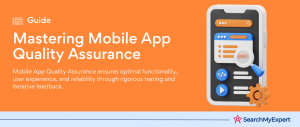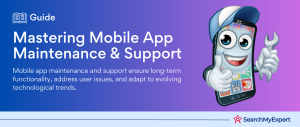Embarking on the journey of mobile app development? Before diving in, it’s essential to understand the landscape, and that’s where market research comes into play. Market research is the compass that guides your app development process, ensuring you’re headed in the right direction. Let’s explore how to conduct comprehensive market research for your mobile app development.
1. Understand the Purpose of Your App
Before anything else, clarify the primary purpose of your app.
- Problem-Solving: Does your app address a specific problem faced by users?
- Entertainment:
Is it a game or a leisure app? - Utility: Does it offer tools or features that simplify tasks?
Having a clear vision will help you target the right audience and set the foundation for your research.
2. Identify Your Target Audience
Knowing who your app is for is half the battle.
- Demographics:
Age, gender, location, occupation, and more. - Psychographics: Interests, habits, values, and lifestyles.
- Behavioral Patterns:
How often they use similar apps, their preferred features, etc.
3. Analyze Your Competitors
Scout the app stores and identify apps that are similar to yours.
- Features: What features do they offer? What’s missing?
- User Reviews:
What do users love or dislike about these apps? - Pricing Strategy:
Are they free, freemium, or paid?
4. Conduct Surveys and Interviews
Engage directly with potential users.
- Online Surveys: Use platforms like SurveyMonkey or Google Forms.
- Face-to-Face Interviews: Gather in-depth insights and understand user expectations.
5. Utilize Analytical Tools
Leverage tools to gather data.
- Google Trends: Understand search trends related to your app.
- App Annie:
Get insights into app rankings, keywords, and competitors.
6. Understand Market Trends
Stay updated with the latest in the mobile app world.
- Emerging Technologies:
AR, VR, AI – how can they enhance your app? - User Preferences:
Are dark modes becoming popular? Do users prefer minimalist designs?
7. Estimate Potential Revenue
If monetization is a goal, consider:
- Pricing Models: Free, freemium, one-time purchase, or subscription?
- In-App Purchases: Can users buy additional features or content?
- Ad Revenue:
Will you display ads, and if so, what kind?
8. Legal and Compliance Considerations
Ensure your app adheres to regulations.
- Data Privacy: GDPR, CCPA, and other data protection regulations.
- App Store Guidelines:
Ensure your app meets the criteria set by app stores.
9. Prototype Testing
Once you’ve gathered all the necessary insights, it’s time to put them into action.
- Create a Prototype:
Develop a basic version of your app that showcases its primary features. - Gather Feedback:
Allow a select group of users to test your prototype and provide feedback. This can be done through beta testing platforms or focus groups. - Iterate:
Use the feedback to refine and improve your app’s design and functionality.
10. Understand Cultural Nuances
If you’re targeting a global audience, it’s crucial to understand cultural differences.
- Localization: Ensure your app is available in multiple languages and caters to regional preferences.
- Cultural Sensitivity: Avoid content that might be considered offensive in certain cultures.
11. Stay Updated with User Feedback Post-Launch
After launching your app, the journey doesn’t end.
- Regularly Check Reviews:
User reviews on app stores can provide invaluable insights. - Update Regularly:
Address bugs, improve performance, and occasionally introduce new features based on user feedback.
12. Monitor Market Evolution
The mobile app market is ever-evolving. Stay ahead of the curve.
- Attend Webinars and Workshops: Regularly update your knowledge.
- Join Developer Communities: Engage with other developers to exchange insights and learn about the latest tools and technologies.
13. Consider Scalability
As your user base grows, your app should be able to handle the increased load.
- Infrastructure:
Ensure your backend can handle more users without compromising on speed or performance. - Feature Expansion:
As your app gains popularity, users might demand more features. Be prepared to expand and adapt.

Wrapping it up, the journey of mobile app development is exciting, challenging, and rewarding. By conducting thorough market research and continuously adapting to user feedback and market changes, you pave the way for your app’s success. Remember, it’s not just about creating an app; it’s about creating an experience that resonates with users. So, keep your ears to the ground, stay passionate, and happy developing!
Blaze New Trails in Tech with these App Developers.
Table of Contents
Toggle






